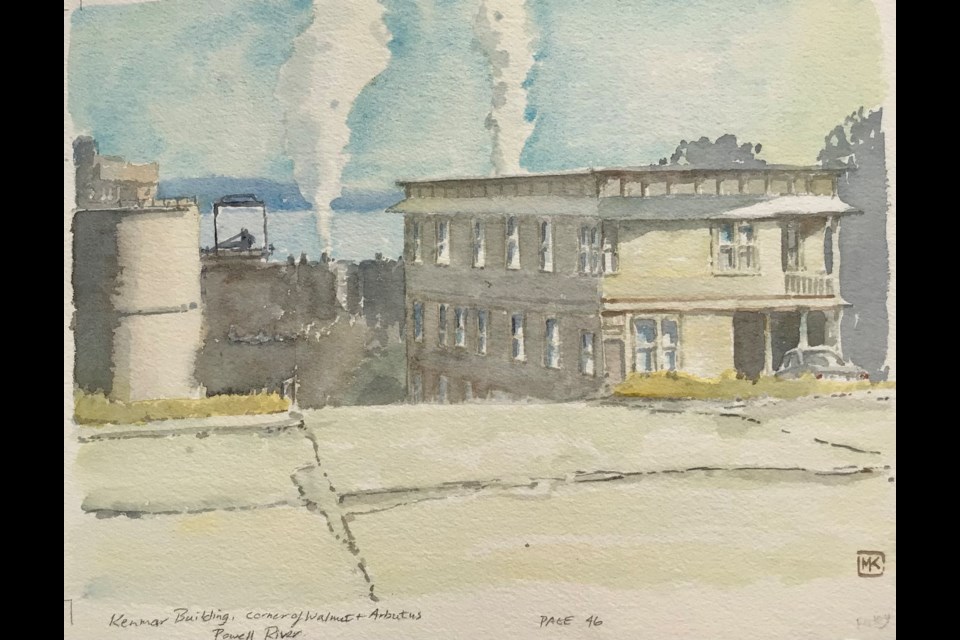Award-winning author and prolific artist Michael Kluckner has travelled the roads of British Columbia for decades documenting farmscapes, old fishing villages, abandoned churches, motels and lodges, and company towns, including historic Townsite on the northern Sunshine Coast, through watercolour paintings.
Kluckner will present his online historical project and book, Vanishing British Columbia, at Powell River Public Library on Friday, August 23, at 4 pm.
Kluckner said it was around 1995 when he started to notice familiar roadside icons disappear or settlements and towns crumbling and forgotten, without even a plaque to remember them by. So, he started painting them and began posting about them, along with any data or information he could find related to these undocumented places.
His website/blog michaelkluckner.com sparked interest and people started sending him old photos and information that he would then add to his online historical record, kind of like crowdsourcing a puzzle of memories. In 2005, he published Vanishing British Columbia as a hardcopy book.
"It [the idea] came out of doing road trips in BC, which I loved to do, but let's put it this way, 25 years ago, it was easier to move around," said Kluckner. "I became very caught up in the idea of roadside memory, and so I started painting these things."
Kluckner said he started to wonder about decrepit farmhouses in the Kootenays or the Savary Lodge on Savary Island for example, which he found out was built in 1934 and owned by A.E. McMaster, general manager of the Powell River Company.
"I wondered, who would have been the person who lived out in more remote parts of the province," said Kluckner. "There aren't any museums, there aren't any archives to find details like that."
Around the year 2000, Kluckner decided to create a website, coinciding with the invention of the Google search engine.
"Just by luck people were getting online at that point, and one of the things they were doing was genealogical research," said Kluckner. "One of the first places that would come up would be my site, and they would remember they had an old shoebox full of photographs, and they would send them to me."
At that time Kluckner was living on a farm in the Fraser Valley and was a regular on CBC Radio’s BC Almanac with Mark Forsythe. The call-in show allowed Kluckner to make connections with the audience members, who would call in with stories and historical tidbits of information about various places in BC.
"The one [story] that I think has been most important to the book, and to me, was about Japanese Canadian families," said Kluckner. “There were Japanese families on Mayne Island, who were interned and then managed to get themselves into the Shuswap.”
During the Second World War, thousands of Japanese Canadians were interned in remote parts of BC. Remnants of coal kilns built by Japanese Canadians can be found on Mayne and other southern Gulf Islands.
Kluckner said he spent most of his childhood in the Shuswap but he knew nothing about the Japanese families who had lived there during the war and postwar period.
"I realized that there was this farm, and where these people [Japanese Canadian family] had lived was about three or four miles from where I spent all of my childhood summers," added Kluckner. "I met people who had been born on this farm during the war, and during the postwar years; I heard their stories and began to tie all this together, this very powerful history.
"The Kootenays is another fascinating place that has ties to the Vietnam hippie era," said Kluckner. "Then the Doukhobors, who are a very interesting, definable group of people, who were pacifists and deeply religious."
Vanishing British Columbia is almost 20 years old and his blog is even older, but Kluckner said he still gets plenty of enquiries from people who are researching a place or a person, and they will send him an addition or correction to make.
"It's been this fascinating process now, as I say, going on for 25 years," said Kluckner.
On his blog, Kluckner stated: "A number of these places have disappeared since I painted them, and the collection is becoming an historical atlas, recording the look and the substance of settlement and abandonment peculiar to British Columbia."
See watercolour paintings of Howe Sound and the Sunshine Coast at michaelkluckner.com.
Join the Peak’s email list for the top headlines right in your inbox Monday to Friday.




